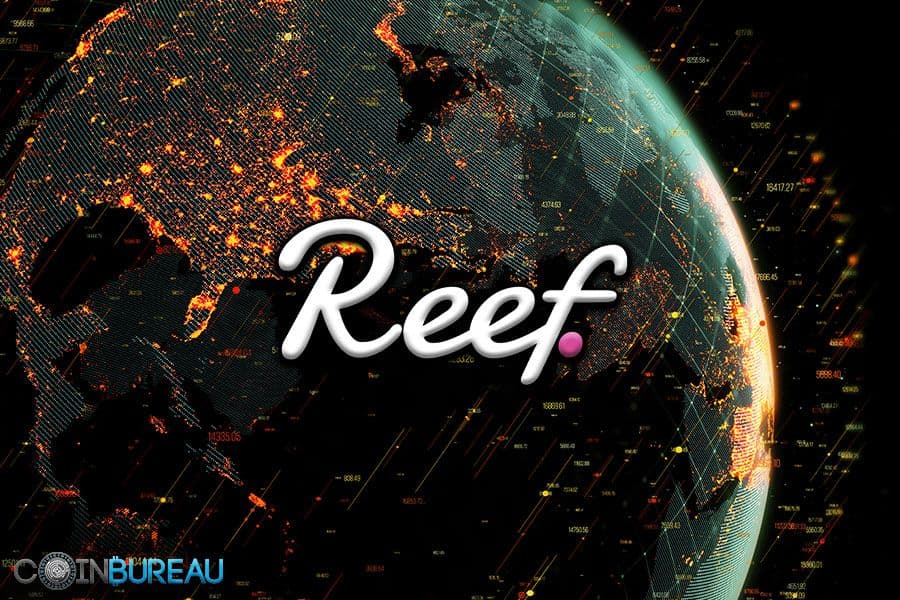Data has become the lynchpin to many business operations over the last several years. Rather than simply being something that’s made part of business decisions data has become a strategic asset, with a concrete value for any company striving for success.
Data is pervasive since it is created at every level of business, from the consumer data that drives sales to the financial data that drives many business decisions. And as the importance of data grows, so too does the rate at which it is collected. In 2016 there was an estimated 16 Zettabyte (ZB) of data produced, but by 2025 that number will balloon to over 160 ZB of data.
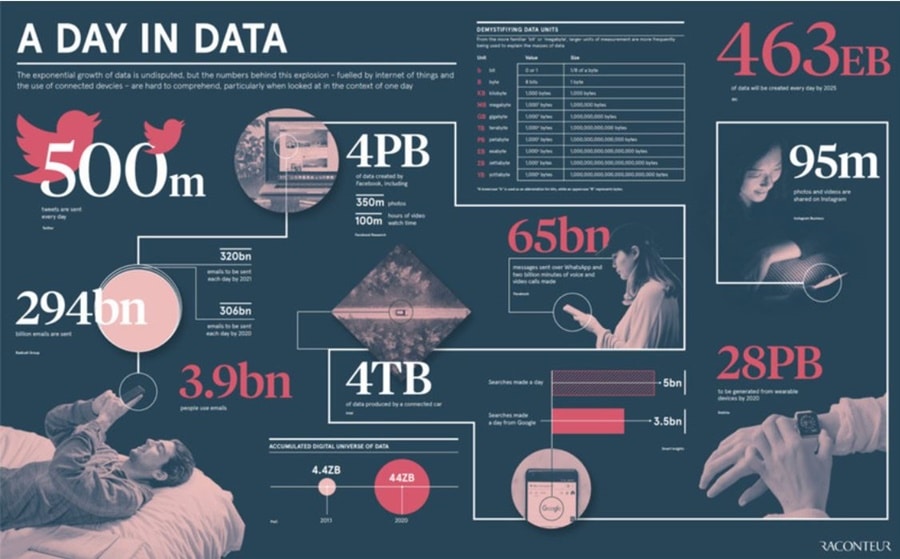 A snapshot of how much data is generated every day. Image via Raconteur.
A snapshot of how much data is generated every day. Image via Raconteur. This massive growth in the amount of data being collected offers potential for companies to use that data, as well as the potential for firms to monetize the data. Unfortunately the real truth today is that most data is simply wasted, unused by the very organizations that could benefit from the inclusion of the data into day to day operational planning. This occurs because so many data collection systems are closed, which prevents sharing of public and corporate data across a wide array of internal and external business units and individuals.
One way in which the utilization of data can be improved is through the use of technology.
Introducing the Ocean Protocol
The Ocean Protocol project is attempting to create a decentralized data exchange that can unlock data generated by artificial intelligence. It utilizes blockchain technology, cryptocurrency tokens, and smart contracts to connect data consumers with data providers. This allows for sharing data with guaranteed trust, transparency, and traceability for all those involved.
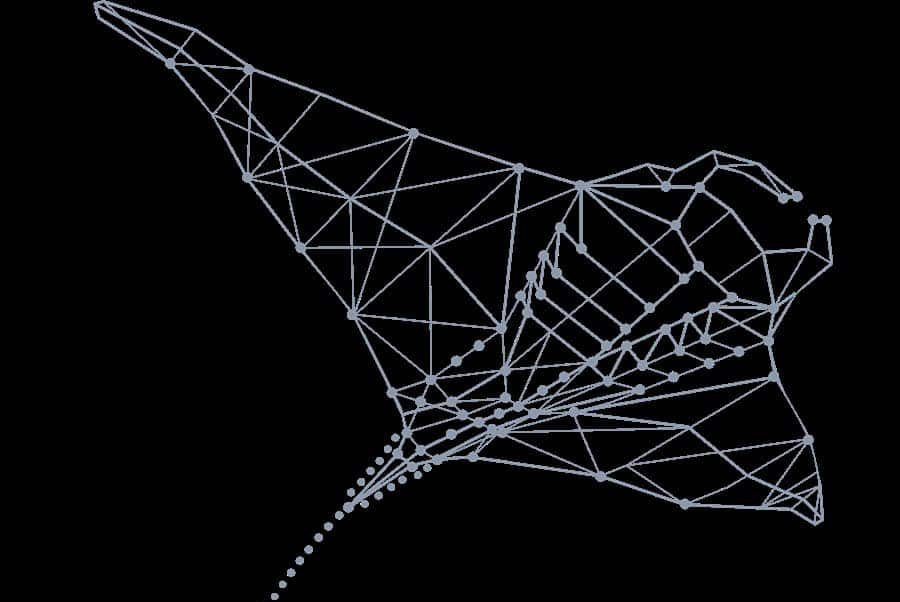 One of Ocean's mascots. Image via Oceanprotocol.com
One of Ocean's mascots. Image via Oceanprotocol.com Within the Ocean Protocol data owners can control their data without being locked into any one marketplace. The project brings together blockchain technology with a framework for data sharing to create a data ecosystem. Under the Ocean Protocol users and businesses will find themselves able to participate in a new Data Economy that stretches across the entire globe, touching every business, person and device. The intent is to deliver the power of data back into the hands of the actual owners of that data, allowing them to benefit from the value contained within the data.
Within the Ocean community you’ll find a broad cross-section of individuals, from the AI/data developers, to businesses and non-profit corporations, to the crypto-enthusiasts and other individuals who believe in the future proposed by the Ocean Protocol. As the blockchain makes the transition to v4 and v5 it will become fully decentralized in its funding as governance moves to the DAO.
That will conclude what’s been an incredible year for the Ocean team, and will also complete the published roadmap as the team continues pushing its vision forward in a fully decentralized manner.
What is the Data Economy?
As we’ve already learned our world is driven by data, and yet much of this data is held and controlled by a small number companies and governments. Companies like Google and Facebook (among others) have learned how to harvest user data and make obscene amounts of money by packaging and selling that data via advertising.
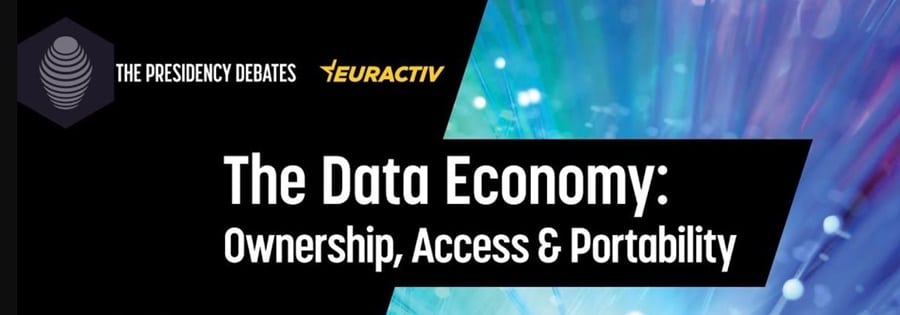 Who owns your data? Image via Youtube.com
Who owns your data? Image via Youtube.com Interestingly, this monetization has been made possible by AI systems, and as the amount of data collected increases, the AI becomes increasingly accurate. This allows ads to become even more targeted and increases the revenue streams for the companies that control the data, making them the most valuable organizations on the planet.
What we need to know is how to equalize the access to data, and how to ensure that the proper data owners are able to monetize their own data, if they choose to do so.
Ocean has made it its mission to make data access more equitable by applying a combination of technology and governance that will keep data transparent and provide trust among all the participants in the data ecosystem.
 The basic Ocean Protocol economic model. Image via Ocean Protocol blog.
The basic Ocean Protocol economic model. Image via Ocean Protocol blog. As you likely already know, in 2020 every single website you visit collects information about you in some way. You’ve seen the popups informing you that the websites in question use cookies, and that they “value your privacy”, but do they really? How many of us have actually taken the time to read the terms of service linked to in these popups?
If you have you know that in essence these documents are there to inform you that the website is collecting any information it possibly can about your browsing habits, and that the company behind the website will use any and all data it collects in any way it sees fit.
This includes advertising to you based on your browsing history, but it also includes selling your data to other companies so that they can advertise to you as well. All of this is making billions of dollars for the tech companies involved in harvesting the data, but it is all happening in the shadows where few people are even aware it is happening.
 There are many challenges in the data economy of 2020. Image via Devpost.com
There are many challenges in the data economy of 2020. Image via Devpost.com And at some point data has now become the most valuable commodity we have. Data is already an industry worth $11 trillion or 15% of the world GDP, and within the next 5 years that’s expected to grow to 25%. The data industry is massive and only continues growing in size and scale.
Ocean doesn’t want to stop the collection of data, but they do want to make it more fair for individuals.
The Ocean Protocol Values
The Ocean Foundation and the associated Ocean Protocol team have espoused the following values:
- Unlock available data to make it accessible to a wider range of organizations and individuals. This will also help unlock much of the latent potential in data.
- Return control of personal data to the actual individuals and require their consent before data providers can utilize the personal data. This includes the granting of both rights and control over the data, and will be verifiable through regular audits.
- Decentralize governance and make it transparent, utilizing democratic ideals to decouple the capital in the system from the governance of the system, while still assuring that citizens have some control in the system.
- Spread the wealth created by data collection and distribution. Rewards will be consistently distributed and speculation will be discouraged.
- Proactively work within the constraints of data privacy and compliance regulations in order to maintain the basic human rights to personal data privacy and content to share or sell such data.
As mentioned above, the collection and distribution of data is a huge economy. By using blockchain technology the Ocean Protocol hopes to resolve the challenges of building a universal data exchange that is populated with data that can be trusted.
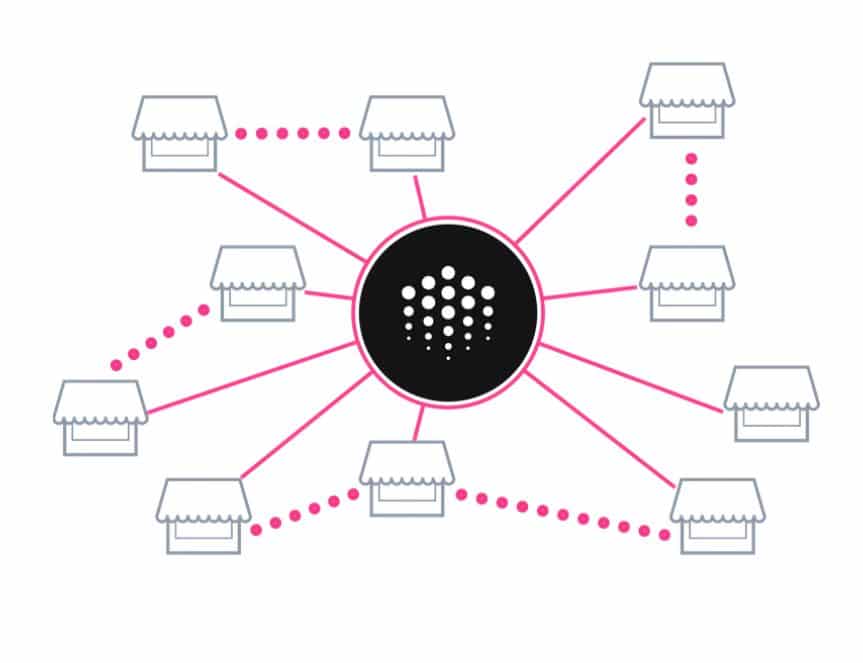 Decentralization helps provide trust. Image via Oceanprotocol.com
Decentralization helps provide trust. Image via Oceanprotocol.comThis blockchain system is an alternative to the growth of an oligarchy of big tech corporations which fail to provide transparency or trust, while also removing control and ownership of personal data, resulting in a loss of personal freedoms.
Data Marketplaces & Data Science Tools
It’s been known by companies for quite some time that data has value. More recently individuals have also come to understand that their own personal data has value. Until now attempts to create marketplaces for this data have failed due to concerns over privacy and control of the data. Ocean is offering solutions to both:
Control: Ocean applies the concept used by non-custodial token exchanges where tokens are not controlled by the exchange. In the same vein data would never be controlled by the marketplace.
Privacy: Ocean believes you can have marketplaces where it is possible to buy and sell private data without compromising the privacy. While this sounds contradictory, Ocean believes it is possible by bringing compute to the data to make it available only to the AI.
Data Tokens & DeFi Implementations
Ocean believes the use of data tokens is a key to improving Web3 developer experience, while also providing better leverage for other Web3 infrastructure and wallets.
The protocol will tokenize the access controls, turning your wallet into a repository of data. To be more accurate the crypto wallets will hold tokens that grant the right to access the data. So crypto wallets will hold data rights, and transferring those rights is as easy as sending the tokens to another wallet or address. This makes crypto wallets a new way to manage data.
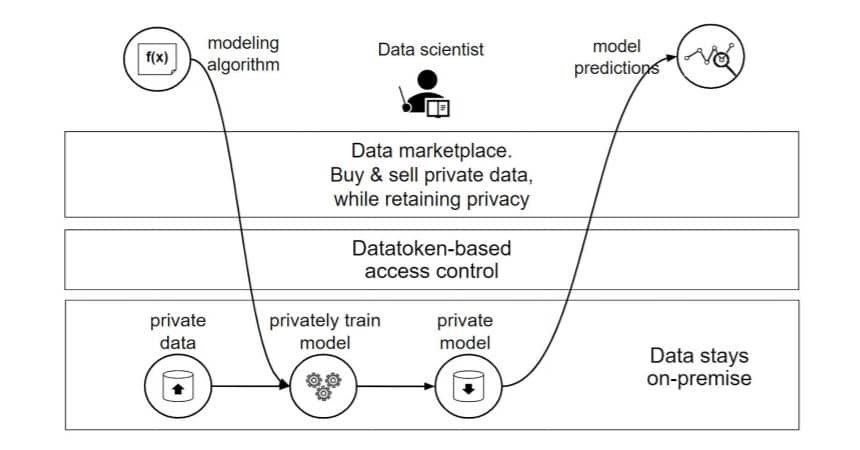 The Ocean Compute-to-Data architecture. Image via Ocean Protocol whitepaper.
The Ocean Compute-to-Data architecture. Image via Ocean Protocol whitepaper. Data tokens in Ocean become like an API allowing data to flow within the ecosystem. They will effectively connect AI, machine learning, and data science to the blockchain ecosystem and allow that data to exist as a financial asset. This plugs data into the world of decentralized finance (DeFi) and makes such things as data loans, data DEXs, data backed stablecoins, and data tokens within a financial supply chain a possibility. DeFi is already huge, but with the addition of data to the mix DeFi has an even brighter future.
Ocean will function as the base layer of the data economy. The native OCEAN token will serve as the reserve currency of the system (through staking), as well as becoming a funding platform and a data or asset platform with a unit of exchange.
Artificial Superintelligence Alliance
In March 2024, Ocean Protocol, Fetch.ai and SingularityNET announced plans to merge their tokens with an aim to form what they call the "Artificial Superintelligence Alliance," where their individual tokens would combine to create a new token called Artificial Superintelligence (ASI), The Block reported.
The agreement aims to establish the largest open-sourced, independent player in AI research and development. The teams behind this move highlighted the opportunity to leverage the growing significance of AI and the expansion of their projects. They intend to build a decentralized infrastructure on a large scale and boost investment in AI.
The combination of our technologies creates a leader in R&D, applications and commercialization of AGI. The unified ASI token is the glue to orchestrate all actors with common incentives. ASI tokens are used to secure the public network, as data access tokens and to unlock computation without needing traditional banking and payment rails. It’s the native currency for the machine economy. - The Block
The projects are set to present integration proposals to their respective governance communities on March 27, marking the commencement of a 14-day consultation period. Voting on these proposals is scheduled for between April 2 and April 16.
Upon community approval, Fetch.ai (FET) is slated to transform into ASI, boasting a total supply of 2.63 billion tokens and an initial valuation of $2.82 per token. SingularityNET (AGIX) and Ocean Protocol (OCEAN) will migrate to ASI at conversion rates of approximately 0.43335 to 1 and 0.433226 to 1, respectively. This amalgamated ASI token is projected to hold a fully diluted value of $7.5 billion, based on prevailing market prices, according to The Block.
A governing council, named the "Superintelligence Collective," is set to be formed to oversee and steer the operations of the merged tokenomic network. SingularityNET founder Ben Goertzel is designated as the CEO of the Superintelligence Collective, while Fetch.ai founder Humayun Sheikh will serve as chairman. Additionally, Bruce Pon and Trent McConaghy will represent Ocean Protocol on the council.
It is imperative, as the AI revolution intensifies, to ensure that AGI and ASI as they develop are not owned and controlled by any particular party with its biased interests. They should be rolled out in an open, democratic and decentralized way. This has been the joint vision of SingularityNET, Fetch.ai and Ocean Protocol from their inception, and for this reason, it makes total sense that our three projects come together to form a tokenomic network that has greater power to take on Big Tech and shift the center of gravity of the AI world into the decentralized ecosystem. - The Block
Fetch.ai, Ocean Protocol Foundation, and SingularityNET Foundation will remain independent organizations. However, they will collaborate closely within the shared ASI tokenomic ecosystem and in managing the operations of the Superintelligence Collective.
Ocean Token
The OCEAN token is the utility token that is used in the Ocean Network to buy and sell data and services. It is also provided as a reward for curating data and staking to provide liquidity. There are also plans to use it to provide decentralized governance in the future. It is also used in the creation of data tokens to run marketplaces.
Basically the OCEAN token is the commodity that runs the entire data economy and incentivizes the community to provide the resources needed to secure and scale the network.
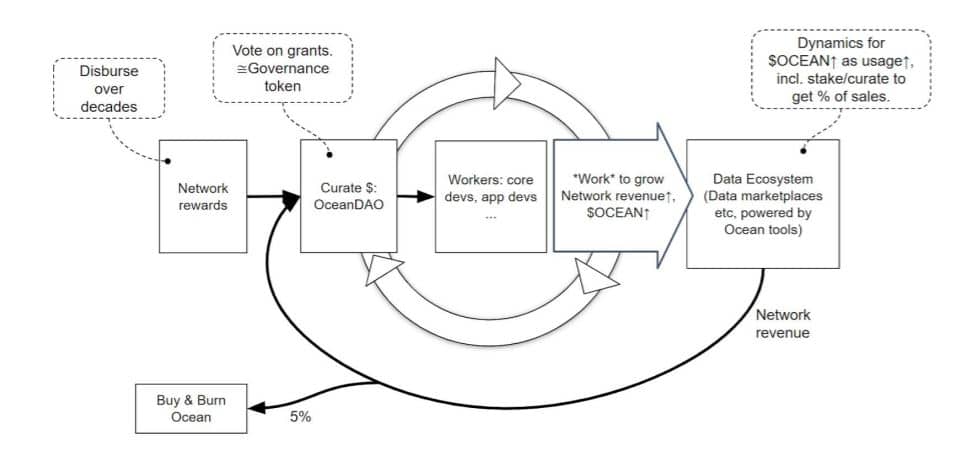 Flow chart detailing the system that powers Ocean Protocol. Image via Ocean Protocol whitepaper.
Flow chart detailing the system that powers Ocean Protocol. Image via Ocean Protocol whitepaper. The OCEAN token was created because even though the ecosystem could use an existing token like Ethereum as the unit of exchange, the protocol required a native token to use as a form of rewards and to set monetary policy. That would not be possible if the protocol were using an outside token as a medium of value since the protocol requires control over the money supply. In addition, any volatility in a third-party token would be a disruption to the orderly exchange in the marketplaces created in the Ocean network.
There are four key actors in the network who are using and earning OCEAN tokens:
Ocean Data Providers: These are the actors in the system who have data available and are willing to supply it to others for a price. When others consume the data they compensate the data providers with OCEAN tokens.
Ocean Data Curators: Ocean has a unique concept in their creation of curation markets. Basically these are a way for humans to weigh in on which data is good and which data is bad. Because Ocean is a decentralized system this isn’t a role that can be taken on by a centralized committee. Instead Ocean allows anyone with experience in the market domain to act as a curator, earning OCEAN tokens as a reward for their services of weeding out any bad data in the marketplace. Curators are kept honest by staking their own tokens to signal good quality data.
Ocean Registry of Actors: Because Ocean is open it not only needs a way to curate the data in the marketplaces, it also needs a way to curate the participants in the system. The registry of actors accomplishes this by requiring actors in the system to stake tokens, which makes good behavior economically attractive, and allows bad behavior to be easily punished.
Ocean Keepers: Finally there are the network nodes that make the datasets available by running the Ocean software. Nodes in Ocean are called Keepers. Like other actors they receive OCEAN tokens for the service they perform, which includes allowing data providers a way to offer data to the network.
The Ocean Protocol Team
As is the case for many blockchain projects, Ocean Protocol also has a large and diverse team of professionals dedicated to the vision of freeing data through the use of AI. The core team of roughly 40 members is spread all across the globe, with backgrounds from a many different industries including artificial intelligence and blockchain technology, as well as business and marketing. Many of the members are entrepreneurs who have had the experience of starting their own companies before joining Ocean.
The leading founder and CEO of the Ocean Protocol project is Bruce Pon, who was also the founder and CEO at BigchainDB prior to starting Ocean. He was also a founder of Avantalion Intl Consulting, a business with a mission to provide banking to the unbanked. He was there from 2008 to 2013 helping the company build more than 18 financial service companies and banks in areas of the world where the unbanked have historically had little or no access to banking.
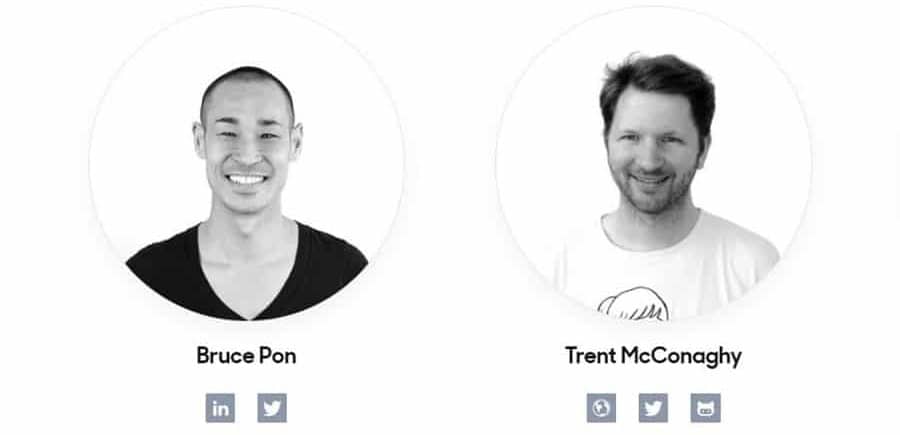 Two of the founders of the Ocean Protocol. Image via Oceanprotocol.com
Two of the founders of the Ocean Protocol. Image via Oceanprotocol.com The second founder working on the project is Trent McConaghy. Trent has been an AI professional since beginning work for the Canadian government back in 1997. He also founded the company ADA which uses AI to help analog circuit designers size their circuits more quickly.
ADA was acquired in 2004 and Trent moved on to found Solido, another company using AI to help circuit designers. That company was acquired by Siemens in 2017, and by that time it was being used by 19 of the top 20 global semiconductor firms to aid in their chip designs.
2023 Roadmap
The first five years of the Ocean Protocol (2017-2022) marked the development of the core infrastructure that can support the decentralized and open data economy. Now, the focus of the Ocean team for its next phase, beginning in 2023 and beyond, is to create value from data.
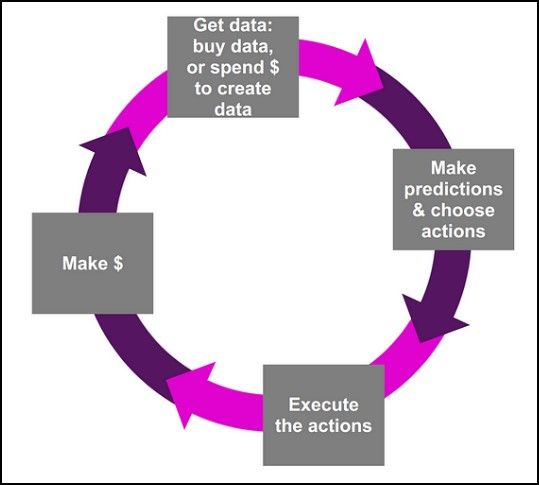 The Data Value-Creation Loop | Source: Ocean Protocol Blog
The Data Value-Creation Loop | Source: Ocean Protocol BlogThe data-value lopp defines how data creates value, which helps its participants make money to fuel further growth of the loop to propel the data economy of the Ocean Ecosystem. The Ocean team has concluded that with the advent of generative tools like ChatGPT fueling a tsunami of interest in AI, DeFi and Large Language Models (LLMs) have immense value-creation potential.
Therefore, to efficiently capitalize on these verticals, the Ocean team underwent a reorganization into three steams -
- Stream 1 - help data Dapp developers.
- Stream 2 - help data scientists.
- Stream 3 - help crypto enthusiasts and OCEAN holders.
 Ocean Team Reorganization | Source: Ocean Protocol Blog
Ocean Team Reorganization | Source: Ocean Protocol BlogOcean Token Distribution
The entire Ocean protocol ecosystem is powered by the ERC-20 OCEAN token, a utility token that allows the community to monetize data and turn data sets into intelligence that businesses can take action on.
 Uses for the OCEAN token. Image via Oceanprotocol.com
Uses for the OCEAN token. Image via Oceanprotocol.com There is a maximum supply of 1.41 billion OCEAN tokens, with just over 613 million already released, and just over 414 million in circulation. The token uses Proof-of-Service as its consensus mechanism and acts within the ecosystem as a means to secure the network and as an incentive for data providers and other actors in the ecosystem. It will also be the governance token once the network is fully decentralized, and is also used for the purchase and sale of data within the ecosystem.
51% of the total supply of OCEAN tokens is planned to be disbursed in a Bitcoin-like emission schedule that will take decades to fully disburse all tokens. These tokens are earmarked to fund the community projects that will be curated by the OceanDAO.
Bittrex International IEO
Ocean had an initial round of funding in the first quarter of 2019, and while the project raised $1.85 million in this funding round they failed to meet their $8 million funding goal.
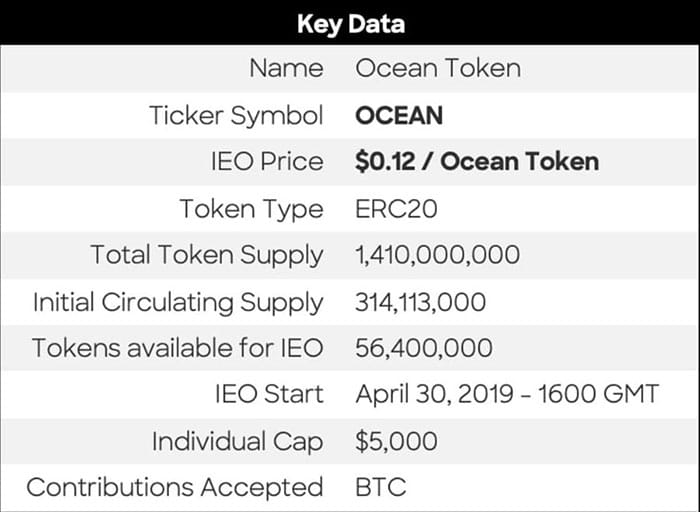 The conditions for the second round Ocean funding at Bittrex. Image via Ocean Protocol blog.
The conditions for the second round Ocean funding at Bittrex. Image via Ocean Protocol blog. A second round of funding was done through the Bittrex IEO scheme, and began on April 30, 2019. In this second round of funding there were 56.4 million OCEAN tokens (4% of the total supply), set aside for sale. Each token was sold at a price of $0.12. Individual buyers were capped at a total of $5,000 worth of tokens, and the only accepted medium of payment was Bitcoin.
This second offering was a resounding success as the team raised $30.65 million, which was just shy of the $31.6 million target. The IEO lasted just 3 days and the OCEAN token was listed on the final day at Bittrex.
OCEAN Price Action
Since the May 2019 Bittrex listing the OCEAN token has been listed on many other exchanges, and as of November 2020 the largest trading volume for OCEAN is at Binance.
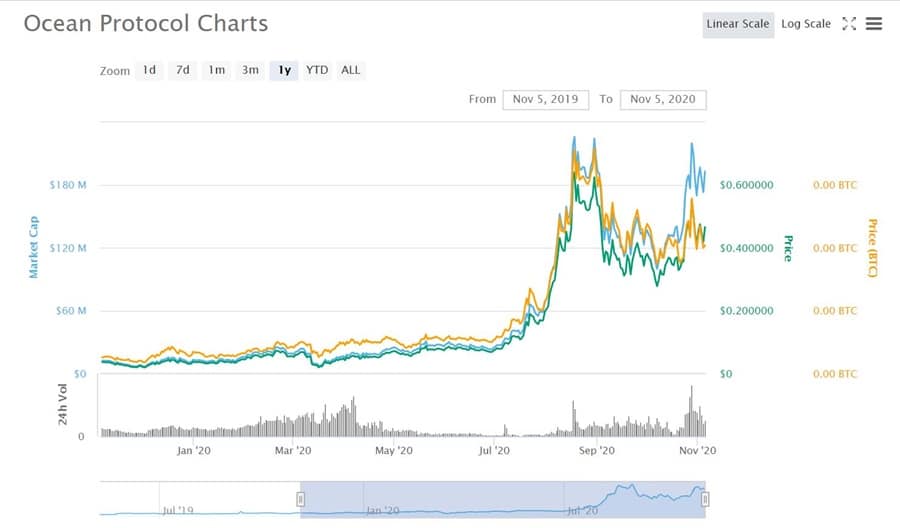 The price history of OCEAN tokens in 2020. Image via Coinmarketcap.com
The price history of OCEAN tokens in 2020. Image via Coinmarketcap.com The token price is also up substantially from the $0.12 IEO offering price. In November 2020 OCEAN tokens are priced at just over $0.46 for a return of nearly 300%. The all-time low for the token came soon after the IEO as price dropped to $0.013653 by August 10, 2019. The all-time high for the token occurred roughly 1 year later as price reached $0.752522 on August 18, 2020.
Conclusion
Ocean Protocol is working in two industries that are in their infancy. Both blockchain and big data technology have made large strides already, but there is still a great deal of development, growth, and discovery left in both areas.
In addition to that Ocean also pulls from the artificial intelligence and machine learning technologies, both of which are also in the very early stages of their development. It is these technologies that will help Ocean make their data private, trusted, and reliable.
Taken all together it is clear to see that Ocean and its team of experienced and talented developers is following a path that could lead to explosive growth in the future as the technologies it is using become more mature.
The steady increase in the price of the OCEAN token is a testament to the belief from the community that the project is on the right track, and that it is addressing a need. Data is everywhere, and Ocean will find a way to package that data and ensure individuals are not taken advantage of by oligarchs, governments, and corporations.

